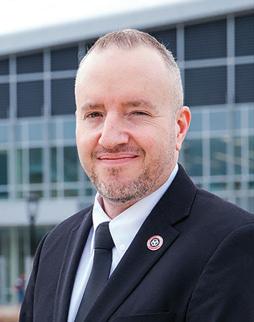
4 minute read
Interview: Barbara Gaba, President Atlantic Cape Community College
Wind power
Cape May college is preparing for a major role in the offshore wind initiative
Advertisement
Barbara Gaba
President – Atlantic Cape Community College
How has the college strategized its workforce development offerings? Our Office of Workforce Development works closely with our business communities. We sit on several of the boards — the Atlantic County Economic Alliance (ACEA), the Greater Atlantic City Chamber of Commerce and the Atlantic County Workforce Development Board. We are very much aware of and attuned to what is happening with regard to workforce development. In this part of the state, we had been very focused on hospitality and tourism, both of which took a big hit during the pandemic. We are getting ready to be a part of a critical initiative related to the wind industry. Wind farms are going to be built off the coast of Atlantic City and we are planning to be very much a part of establishing a global wind organization and creating certified basic safety and sea survival training programs, including a support facility at our Atlantic City campus. To do so, we are applying for a $3.3 million grant for those specific goals.
What is your take on COVID-related learning loss? We are concerned across higher education regarding the learning loss that occurred at the high school level during this past year. We intend to continue to reach out through virtual events. We reach out to high-school counselors and parents to participate in what we call virtual information sessions. We do offer GED and other high school preparation programs.
It has been a challenge because students have not been in school. We realize that when they do come back, we are going to have work to do, but we are prepared in terms of the programs that we offer to assist them.
Moreover, there will be no tuition increase; it will remain flat throughout 2021. We are very sensitive to the environment and realize that many people are struggling, particularly in this area. Our high reliance on tourism and the gaming industry translated into significant job losses. How do you see the near-term playing out for the region’s higher education sector? It is going to be a challenge, but we are anxiously looking forward to going back in the fall. We’re preparing for that as we speak. It is critical that we get back to normal as much as we can. We realize too that when we talk about normal, we really do not want to go back to what we were before. We learned a lot of lessons and our top priority is getting students back into the classroom. Despite all the challenges that we face with the pandemic, it has created some opportunities as well. We want to do better and one of the lessons of the pandemic is that there is a digital divide that we need to address. Many students lack the means and technology required for online learning. Going back, we are going to provide computer laptops on loan for students.
( ) ideal for the youth of South Jersey, there is also an increased effort to teach technical and vocational subjects. Such an approach is essential for the economic vitality of the region; it is from this training that the jobs of tomorrow will come. Investing in vocational education is key in New Jersey. Furthermore, economic diversification is already a byword of South Jersey, and when one considers that students from the region often forge a path elsewhere in the country, it is a reminder that what happens in South Jersey reverberates nationally.
There is also a renewed effort to get the private sector more involved in secondary education. By being engaged, curricula can be designed to meet the needs of the local community, which could result in both economic growth and poverty alleviation. In South Jersey, institutions are at work engaging with the local business community. Rowan College of South Jersey is engaging with night schools to teach essential trades, and it is designing programs that will meet a rising demand from the wind industry. At Rowan University, there is a similar effort afoot to engage the local healthcare industry. School officials see great potential in such partnerships.
The pandemic has also prompted the state government to be more involved in workforce training. Facing the massive (and sudden) unemployment that arrived in spring 2020 as the world shut down, officials in Trenton realized there was a need to act. The New Jersey Department of Labor and Workforce Development, partnering with Metrix New Jersey, launched the SkillUp New Jersey program, a free online training program that will help job seekers throughout the state develop their skills and undergo training for

Some New Jersey colleges are requiring students to be fully vaccinated.

Michael Cioce
President – Rowan College at Burlington County
IT and cybersecurity are experiencing a boost in demand due to the consistent need for these occupations throughout the pandemic, which we labeled as “virus-proof” careers. Logistics, supply chain management and healthcare paths are also virusproof. Education has experienced a serious uptick due to the early retirement of older teachers who aren’t comfortable with online learning environments. The other big uptick we’re seeing is in criminal justice and political science in response to the equity and diversity issues that have emerged over the past year. Just as there has been a “Fauci effect,” there has also been a George Floyd, Breonna Taylor effect.









